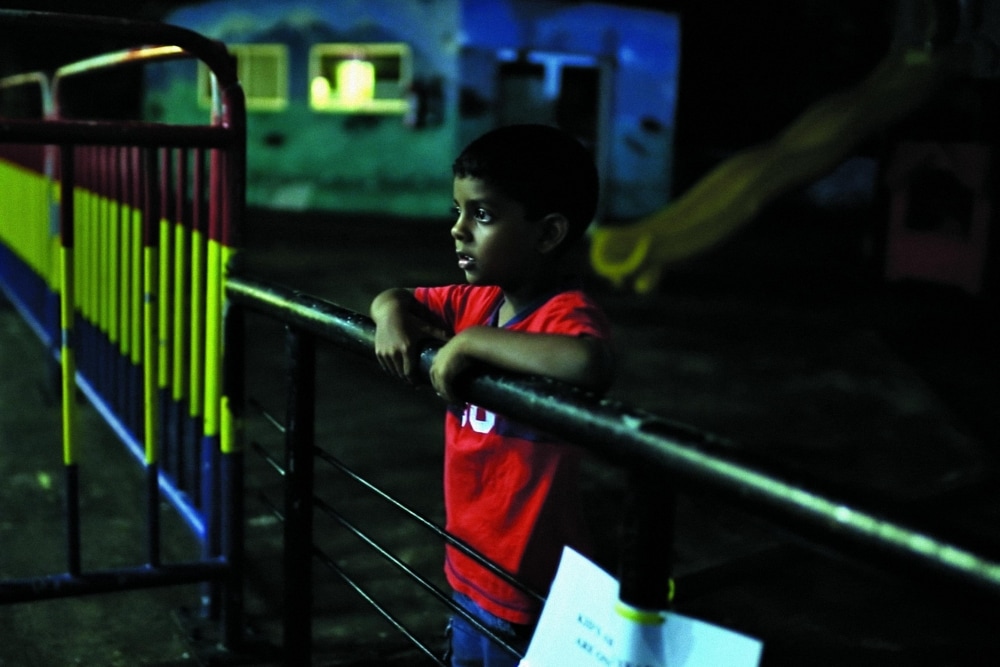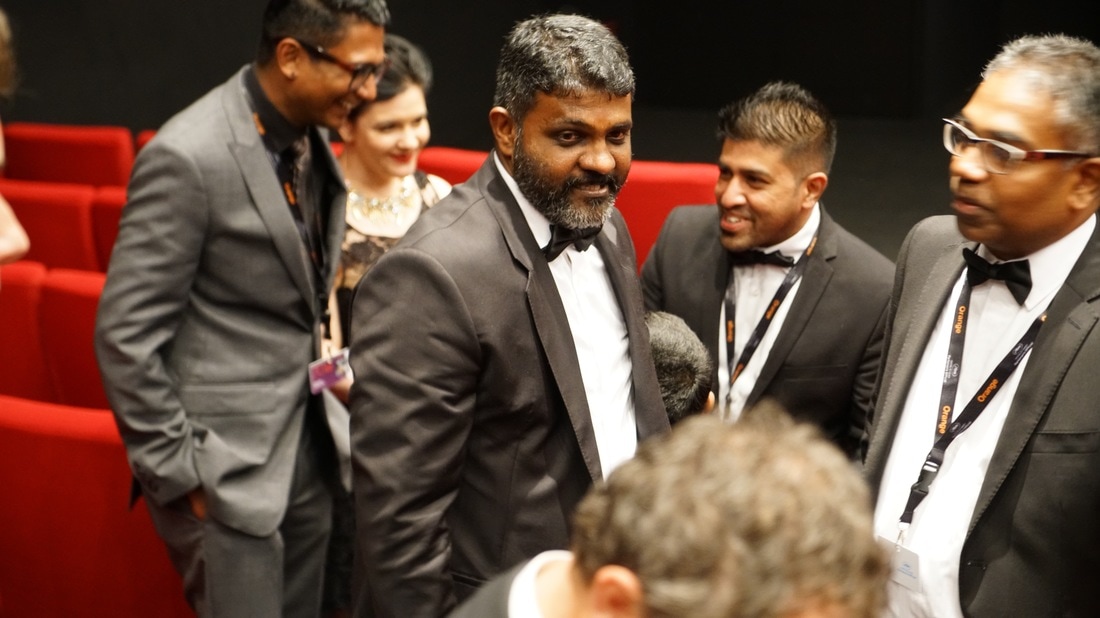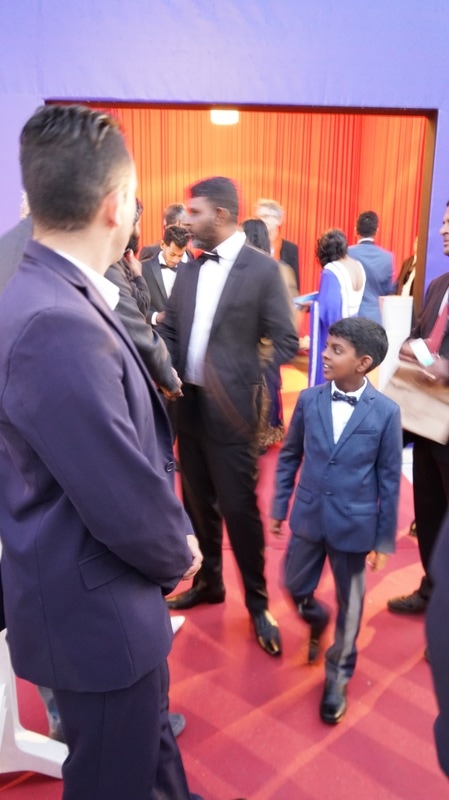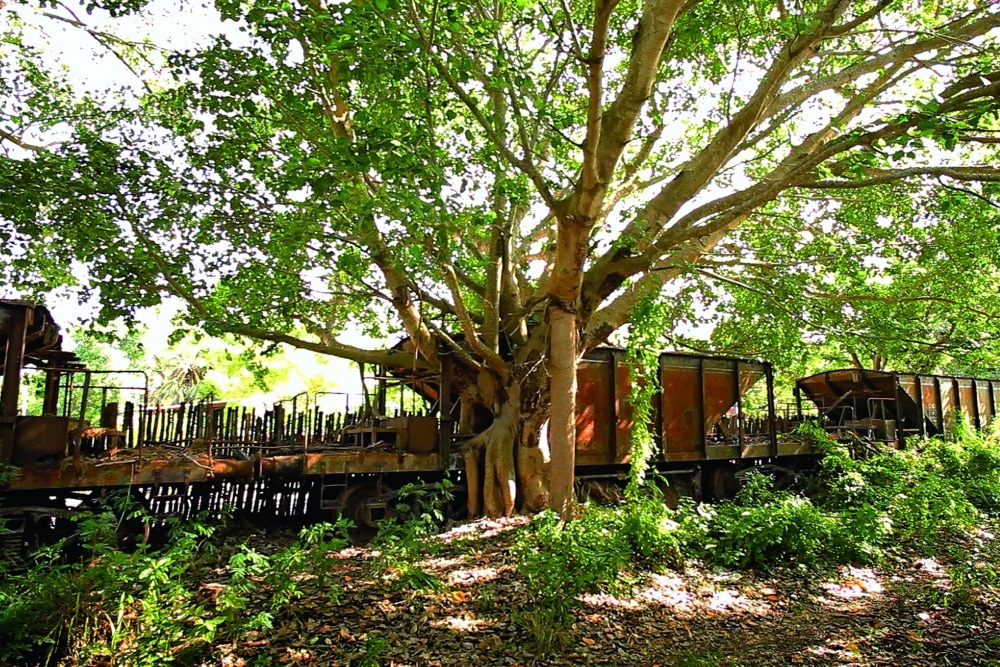|
Jude Ratnam makes directorial debut with Demons in Paradise, emotional exploration of Sri Lanka's civil war Jude Ratnam's documentary Demons in Paradise is that cinematic paradox -- a beautiful film about a bloody conflict. The legacy of the civil war in Sri Lanka is his subject, a struggle that claimed tens of thousands of lives between 1983 and 2009. Among the filmmaker's earliest memories are fleeing the south of his country, in the midst of pogroms targeting his Tamil minority community. "I escaped on a train when I was five years old," Ratnam recalled at one of several appearances he made during the Cannes Film Festival, where Demons in Paradise held its world premiere. I didn't want to make a narcissistic film... to say, 'it's about me.' Trains are a continuing motif in the film, their rhythmic motion and percussive metallic clacking a hypnotic counterpart to the stories of war and inhumanity. Among the few glimpses of the war's victims come in a scene on a train, as Ratnam sifts through a stack of grim photographs while the railway cars rattle along the tracks. Meeting at the Grand Palais in Cannes, I asked Ratnam why he evoked the conflict not through archival video, but only with still images. "Actually now that you ask the question I'm wondering about it. It's just you go by intuition," he responded. "Probably it's because all that you have as a child about the war is just frozen moments. So I think the photographs are like that - they're just frozen moments of reality... It like stops you, makes you wonder, ponder." One look at the trailer will give a sense of the film's poetic imagery (Chinthaka Somakeerthi and Mahinda Abeysinghe served as directors of photography; Jeanne Oberon edited the film). The technical mastery may come as a surprise, given Ratnam's professional background. "I never thought I'd make films because before making films I was a human rights activist," Ratnam told the Ford Foundation's Cara Mertes during a conversation as part of the Marché du Film's Doc Day in Cannes. "When you see so much of death and destruction go around you it leads you to some sort of disillusionment. I guess I was disillusioned with what I was seeing and I wanted to take a step away. And that step away was filmmaking." To be sure, Ratnam's human rights background is evident in Demons in Paradise, suffusing the film with a humane perspective. "The film is basically dealing with the problem of identity," he told Mertes. "Since 1948, since the independence [from Britain] there was this was this systematic repression of the [Tamil] minority, especially based on language. That's something very unique to Sri Lanka. And the '83 pogrom was the watershed... So the film actually starts with the 1983 pogrom and goes on to have an introspective look at the idea of fighting for one's own identity." Ratnam does not limit himself to cataloguing violence inflicted on Tamils by the Sinhalese majority. Tamils turned on Tamils during the civil war; Ratnam delves into the internecine battles between the largest rebel group, the Tigers or LTTE, and rival factions, which led to further loss of life. "At one point Tamils were more terrified of the Tigers than of the government," he stated. "In war no one is innocent... How do you reconcile this, that was the question that was running all throughout [the storytelling process]. Post war what has been built up is that Tamils were the victims, whereas the truth is somewhere in between." Ratnam spent 10 years on the project. He said at first he had no intention of putting himself in the film, but producer Julie Paratian convinced him that would help structure the narrative. "There were so many people who had died and you don't want to put yourself as -- I didn't want to make a narcissistic film... to say that it's about me. So it was difficult," he acknowledged. "[But] I took the leap and that led to me looking much more deeply into my own family's story where my uncle had been part, as a militant, and that led to the other characters. It was a case, like what Herzog would say, it was the setting first. Then the characters emerged and then the story. That's how it was." I think... documentary is serious art and that it can be cinematically as strong as any fiction is. For all of its historical grounding, Demons in Paradise in some sense is less a political film than a subjective, personal one. "I told [my producer] Julie, 'I don't want to make a "saving the world" film,' especially because, sadly, that's how documentaries are perceived -- mostly that they are there for advocacy and to save the world. Whereas I think, no, documentary is serious art. And that it can be cinematically as strong as any fiction is. Some stories cannot be said in a fictitious way and only through the documentary," Ratnam told the Doc Day audience. "Advocacy may follow but it was mostly a question of grappling with the idea of a human condition and to capture it cinematically." Upside Distribution is handling release of the film. Ratnam told Nonfictionfilm.com he hopes it will be seen in North America.
"Once place I really want to show the film is Canada, because of the [Sri Lankan] diaspora and because of the young generation that's growing up there." He added, "I heard from somebody that Sundance is interested. If they want the film I would love to take it." He is naturally keen to see Demons in Paradise play in Sri Lanka as well, despite its depiction of a ruinous conflict that only came to an end in 2009, when the government smothered the last of the Tiger resistance. "I really hope with the present government, I hope. Because if it was the previous regime, before 2015, no, I don't think we had any chance," he said. "Even though it's talking about the violence within the Tamil community, it's still alluding [too] to the victimization of the Tamils so they wouldn't have wanted to show it. But with the present government I do hope they take it up." |
AuthorMatthew Carey is a documentary filmmaker and journalist. His work has appeared on Deadline.com, CNN, CNN.com, TheWrap.com, NBCNews.com and in Documentary magazine. |
- Home
- News
- Videos
-
Galleries
- 2019 Tribeca Film Festival
- Full Frame Documentary Film Festival
- 2019 SXSW Film Festival
- SXSW 2018 Gallery
- 2019 Sundance Film Festival
- Outfest 2018 Photo Gallery
- Outfest 2017
- Sundance 2018 Photos
- 2017 LA Film Festival
- 2017 Cannes Film Festival
- Tribeca Film Festival 2017
- SXSW 2017 Gallery
- 2017 Berlin Film Festival
- Sundance 2017 Gallery
- 2016 Los Angeles Film Festival
- Cannes Film Festival 2016
- SXSW 2016 Gallery
- Berlinale 2016 Gallery
- Sundance 2016 Gallery
- Filmmaker Gallery
- About
- Contact
Proudly powered by Weebly
- Home
- News
- Videos
-
Galleries
- 2019 Tribeca Film Festival
- Full Frame Documentary Film Festival
- 2019 SXSW Film Festival
- SXSW 2018 Gallery
- 2019 Sundance Film Festival
- Outfest 2018 Photo Gallery
- Outfest 2017
- Sundance 2018 Photos
- 2017 LA Film Festival
- 2017 Cannes Film Festival
- Tribeca Film Festival 2017
- SXSW 2017 Gallery
- 2017 Berlin Film Festival
- Sundance 2017 Gallery
- 2016 Los Angeles Film Festival
- Cannes Film Festival 2016
- SXSW 2016 Gallery
- Berlinale 2016 Gallery
- Sundance 2016 Gallery
- Filmmaker Gallery
- About
- Contact






 RSS Feed
RSS Feed